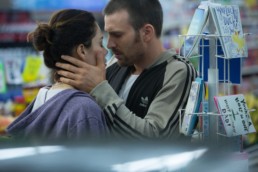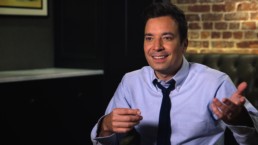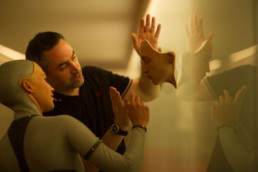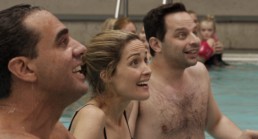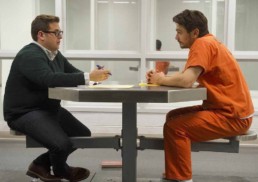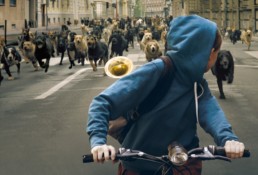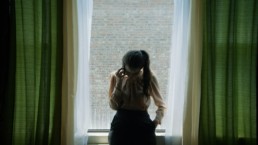Review: 'Playing It Cool'
As its title might suggest, there's a smug satisfaction and self-assuredness that drives this middling celebrity smile-and-hangout affair. Fortunately, Playing It Cool has an overall lightheartedness to it that keeps the thing from feeling offensively heavy-handed, even though it attempts to use the all-too-familiar convention of being self-aware of its own genre, acknowledging rom-com cliches while simultaneously playing right into those hands for a tired watch.
If you like your romantic entertainment slow-pitched and soft-balled, or really as more of an excuse to have a fun outing with famous friends, you'll find a playful time here and without having to give up much in return. All others should be able to smell this stinker miles out.
Chris Evans, buzzed hair and Venice Beach cool, stars as our male lead named Me, which should show you right off the bat just how shamelessly self-referential this story intends to get, and which it plays off of for the remainder of the movie.
Me, who spends nearly the entirety of the film providing voice-over narration, is more or less a needy and selfish guy, blaming his hesitations over true love to the abandonment by his mother as a child as the catalyst that keeps his movie-star self from believing in such things with such beautiful women.
Especially because Me proceeds to meet Her (Michelle Monaghan), and sparks fly – or more specifically, CG'd electricity courses through their hands upon touching. Again, it's small and unexpected instances of fun that give the film its defeating charm.
The laid back Venice Beach cool will certainly distract you from the fact that Playing It Cool is a bargain-bin offering that will only entertain the most forgiving of audiences.
There's a lot of half-ideas that are jammed into this thing, and not totally insufferable, mostly because Evans and Monaghan are beautiful movie stars with enough easy-going casualness and chemistry between them to keep the thing at least watchable. Me is also a struggling screenwriter, sort of working on a romantic comedy script before he can work on a generically-named "action movie" and spend six weeks in Malaysia, which Me's sleazy agent (Anthony Mackie) riffs on over how the women are ready for the action, in colorfully crass detail. Not the movie's most redeeming part.
But Cool's real saving grace is its lassoed effort of its cast. Between Evans' and Monaghan's googly-eye making is the "comedic relief, "coming from the likes of Topher Grace, Luke Wilson, Anthony Mackie, Martin Starr, Aubrey Plaza, and Philip Baker Hall.
Not to go unmentioned – there are also a solid handful of cut-to scenes, funny asides where Me will, upon listening to any person's story, or even his own voice-over, envision himself in the lead role of these scenarios, with Her face in the lover's role: in one scene, he's in Korean traditional dress, in another he's an astronaut, even throwing in a graphic novel animated scene for eclectic's sake. There's a whiff of The Secret Life of Walter Mitty, but even bringing it up as comparison feels cheap and untrue.
If you're willing to wade through the generic and mediocre storytelling, all you're going to get is a whiff of another self-referential romantic comedy movie. The laid back Venice Beach cool will certainly distract you from the fact that Playing It Cool is a bargain-bin offering that will only entertain the most forgiving of audiences.
Playing It Cool is in theaters this weekend.
https://www.youtube.com/watch?v=JlvyE_Rhzy8
Review: 'Misery Loves Comedy'
Last year's tragic death of Robin Williams shook a culture at large. Most regrettably, the devastating announcement was only a heartbreaking reminder of the pains and inner-torment that comes with the life of comedians and their life's work, an extension of a fractured sense of self at the root of it all.
Misery Loves Comedy, a new documentary that rounds up an impressive group of comedians, attempts to address the underlying darkness inherent in the art form, and ultimately, ask whether or not misery is needed to be funny.
Unfortunately, what we receive is nowhere near the definitive answer to these questions, and is a less than stimulating watch that offers no advancement or worthy takeaway on this subject, that could and should have otherwise shined in these revelations.
Director Kevin Pollak's Kickstarter-backed project drags from start to finish, in what is the film's most fundamental problem: its looseness and unfocused vision, the antithesis of what any of these veteran comedians would tell you makes for good entertainment.
The famous names and faces here, from Tom Hanks to Jimmy Fallon, to Larry David, are the film's most impressive part of this show, but the sheer number of comedians, from Judd Apatow to Martin Short, to Amy Schumer, continuously reminds us that these talents' time and generics are being largely wasted.
Does Pollak really expect each of these comedians to open up honestly in answering whether they themselves deal with the darkness, and can talk in detail of it to our entertainment?
It's a dead paced film, most attributable to all of the unforgiving elements that Pollak chooses to dress the thing with. Butt-ended interviews of recognizable faces and voices desperately need music underneath or in transitions, or at any point really, and the absence of it denies any fluidity.
The interviews, in their simple and flat staging, lack any depth or movement that could have animated these stories and moments in more revealing and honest fashions. Instead, Pollack proves cold, choosing to sit off-screen and dumping heavy-handed questions onto the talent for them to make the thing work. It's a dynamic that seems to be felt throughout the film, and since the talent seems to be aware of this, uneasy dispositions lend to making the viewer think these sit-downs were captured in fleeting moments between these comedians other engagements.
Every talent seems to hit the same east target that's in front of them, answering about their earliest awareness of "being funny," the respective comedy "scenes," the inevitable relationship with drugs, and the personal insecurities and fears that stem from it all.
These answers go about as far as the interviewees can reach, an extension of this film's problem as the questions (broken up with a reappearance of title cards) are so simply asked. Basically, everyone answers Pollak's awkward questions however they choose to appear on camera. Some are more open and vulnerable while the majority remain composed and un-offering into the mind of what we are so anxious to be.
The film continues to run through an uneven list of anecdotes, stories, memories, and other waxings on comedy philosophies. However, the truest highlights of the film also happen to, perhaps unsurprisingly, come up in some of these comedian's more emotionally-baring confessions and honesties. Nick Swardson opens up about struggling with drug addiction at the age of fifteen until he was uplifted by Adam Sandler and moved his charged obsession to comedy. Maria Bamford offers the most insightful look into what this film should have been about, revealing her struggle with mental illness and her time in a psychiatric ward. These surprising and almost unsettling moments shine a light on what the rest of these comedians quietly struggle with.
Perhaps there is an inherent flaw in the set-up of this doc that limits it from being anything more. Does Pollak really expect each of these comedians to open up honestly in answering whether they themselves deal with the darkness, and can talk in detail of it to our entertainment? These comedians mostly skirt these ideas or pull at these threads much too lightly. For as interesting a premise, we're mostly left in the same head space, none-the-wiser, or happier.
Misery Loves Comedy opens at the Sundance Cinemas West Hollywood today.
https://www.youtube.com/watch?v=3v2ewpePpO0
The Beautiful Mechanics of 'Ex Machina'
"Deus ex machina," meaning "god from the machine," refers to an ancient Greek plot device used in storytelling that refers to the inexplicable saving or resolving of an assumedly unsolvable problem by the sudden and unexpected intervention of some new character or event, through miraculous, divine hand.
You might notice that in the title of the new science fiction drama. Ex Machina, the Latin "Deus," or "God" ("divine") is removed. Appropriately, God doesn't exist in this film's science-ruling near-future here either, and with that, allowing for moral ambiguity.
In Machina, humans have evolved highly enough to assume the role of creator of life, taking out the need for such deity's reverence. Yet as writer and director Alex Garland shows, there can be devastating effects in playing God, creating self-aware sentiments that show that when all you have left is "from the machine," the state of "life" itself is one that might not only apply to humans.
••
"I didn’t even really plan to be a novelist..."
English-born Alex Garland, best known for his screenwriting efforts for big-screen event pics, particularly the Danny Boyle films 28 Days Later... and Sunshine, as well as Never Let Me Go and Dredd, is a revered voice in sci-fi cinema for creating such unique and long-standing films that rile not just imaginations, but so to their more intelligent quotients. Which is why it's a breath of fresh air to see his first directed feature film hit theaters, as it is already showing promise of one of the year's best.
Machina tells the story of a young programmer, Caleb (Domhnall Gleeson), who is selected to participate in the opportunity to test an artificially intelligent robot, Ava, (Alicia Vikander) created by the tech-wiz recluse and quirk-capitalist Nathan (Oscar Isaac) and discover what qualities make it human enough to possibly pass.
The stylishly beautiful compositions and camerawork might allude to the work of a director with ample film experience. And you'd be right, but not if you thought directing was his plan to do all along – or movies, in general, for that matter. "I didn’t even really plan to be a novelist," Garland relays to me, referring to his hit The Beach that was later adapted by Danny Boyle. "Like the whole thing that set the thing in motion was never, in a strange way, an intention. It actually came from having worked in comic books, drawing rather than writing. And realizing I was never going to cut it. And I’d been writing for stuff that I was drawing, and I essentially ditched the drawings and, therefore, ended up writing. And if you’re writing without drawing you’re kind of writing a novel, and that’s sort of what happened."

••
"I did really like the way it was planned to be executed, in sort of this sort of chamber piece vibe, because it’s very exposing. It doesn’t give anyone anywhere to hide."
There are only three characters, and yet any more would throw the whole thing off course, or at least be a different movie. The small dynamic provides, to Garland, a tonal view of how these big ideas could be most effectively understood and related to these very tight characters and relationships: "I did really like the way it was planned to be executed, in this sort of chamber piece vibe, because it’s very exposing. It doesn’t give anyone anywhere to hide. You can’t hide behind sort of action sequences, you can’t hide behind momentum, to push you past an awkward plot point. One of the ways you get past awkward plot points, of the sort we were just talking about, is you just drive past them. But then something like this is too slow and reflective to be able to do that."
Garland further notes this in the rest of the production: "And that actually applies to everybody. Like, the composers have nowhere to hide. If they’re trying to write a bit of music for Ava as a theme, that feels kind of beautiful…if it’s not beautiful and innocent sounding, and they fail to pull it off, it’s very stark, how kind of the degree to which it’s failing. Likewise the camerawork. If the camerawork’s not beautiful, it’s just going to sit there in this real obvious way. And if the performances aren’t good then that would be the same."

••
"I’ll have one script that I think works for every thing I write."
For all of Machina's big ideas and heavy genre, the film is a whole lot of fun. Heck, a surprising portion of it is actually quite funny. But hiding just behind those humorously settling moments are the planted workings of story misdirections, fake-outs, and twists, that give the whole thing increased gains in excitement, as the intoxicating experience becomes clearer.
"I think approximately, I write three scripts," Garland says of his scripting process. "Like, I’ll have one script that I think works for everything I write. I mean that’s a kind of loose average, but it’s actually pretty close when I look back at the projects I’ve sort of got on my desk."
Asked whether it was his intention to always direct this film, he deflects to the intention of just writing the story, which is telling of his work's process, that simply writing the story is, in and of itself, all the intention that is needed. "At the time I was writing it, and this is always true when I’m writing a script, the only focus in my head at that moment is “Does this work?” In the terms like I’m hoping it works. And the reason that is is because most scripts I write, at the end of that process no it doesn’t work.
At the writing stage, I’m really just testing it, and I’m not talking about it to anyone and I’m not thinking of showing it to anyone, I’m just, for my own purposes, wanting to know if this works or not. And all of those other things about who’s attached to the film come later, because I would feel like I was doing something very premature if I was talking to anyone in those terms, because like, to me, it’s genuinely uncertain. I never know if an idea works until I write it out, cause there’s too many ways you can trick yourself in like a script breakdown or like a treatment or just in thinking about it, there’ll be some problem and your brain just glosses over it. And then when you sit down to write it you realize, no, this is like a fundamental problem and you can’t get around it. So yeah I’m a bit of weary I guess.
••
"There's this sort of other magic (Alicia's) got. And that, in essence, is exactly the kind of quality Ava needed to have."
Of course, with such lofty and fantastical ideas, the film required a fundamental connection from audience to character, no small feat for its actors but is exactly what Garland's troupe provides. A familiar face to Garland's past projects, Domhnall Gleeson plays the film's guinea pig Caleb, who is selected to interact with the AI and show whether it passes with "human-like" consciousness. Caleb as the control group, however, learns that there may exist underlying motives to his testing, which Gleeson charters seamlessly here. Asked if he had written any parts in mind for any of the actors, Garland only says that he knew Gleeson could do this character, and so he called him up and offered it to him.
To play the role of Nathan, a question mark of a character that slowly shades into darker territory, is one of the most fantastically slippery actors working today. Garland noticed this too, and praises the work of Oscar Isaac, whose recent films are as prestigious as it is eclectic (Look to the whiplash turns from Awards-aimed headlining acts in 2013's Inside Llewyn Davis and last year's A Most Violent Year to this December's Star Wars: The Force Awakens for a short example).
"Oscar, one of the things you notice, is he just vanishes, in part to part," Garland praises. "He's an incredibly talented actor and he just simply vanishes. It's really hard to keep track of what Oscar Isaac is, in some ways, because the performances are so different from film to film. They're all good, but the characters feel so different. It's hard to draw lines between them."
Yet providing perhaps the most stirring and captivating performance here is that of Ava, the sleekly designed AI whose plastic and metal fixtures and artfully exposed wiring make her appear as an iPod in its most beautiful human form. If audiences are unaware of Swedish actress Alicia Vikander, they won't be for long, who will be starring in many releases in just this year alone.
"I'd seen her in a Danish film called A Royal Affair, where she plays opposite Mads Mikkelsen...Mads Mikkelsen is obviously an incredibly charismatic character actor, very experienced. But, you'll see that you just get hypnotized by this girl. She's probably then maybe like twenty or twenty-one years old, and has an amazing presence. She just really owns scenes, and your eye tracks whatever she's doing on screen. And she's very good at acting, but she also has this other thing which is just, she makes you want to look at her, she makes you want to watch her. And that's not just to do with being beautiful.
She's obviously very beautiful, and she's a very good actress, but there's this sort of other magic she's got. And that, in essence, is exactly the kind of quality Ava needed to have."
••
"(Ex Machina) is the only project I've ever worked on where I just feel a kind of undiluted sense of contentment with it."
As Machina has already shown in its first-wave limited release, its connecting in the specialty-film market, arousing audiences' senses of smart spectacle, high-brow concept served in stylish and thrilling movie tones as only as skilled and veteran a storyteller as its writer/director is.
Machina, as opposed to Garland's other accomplishments in film, stands out in particular, as only a creative type would acknowledge: "I just feel really good about it. It's the only project I've ever worked on where I just feel a kind of undiluted sense of contentment with it. There's always like some big caveats to me, there's always some thing, and it's usually a compromise. There'll be a compromise I made somewhere, and I look at it, and it just sits there right in the middle of the movie, sort of like an accusation almost saying like, 'Why did you compromise on this thing?'
I'm not sure I'll ever get the chance to do that again. There was like a combination of factors that led to proper creative freedom, and that's hard to get in film for any number of reasons. I feel truly lucky that we did it and somewhere in my working life at least once I managed to do that."
In ending our phone conversation, I ask if I can sell the movie to friends and audiences-at-large alike as "Jurassic Park meets I Robot meets The Shining." In a humbled laugh, Garland allows. "That's a good pitch. I like that."
So, for audiences looking for a film like Jurassic Park meets I Robot meets The Shining, then I know of one...
Ex Machina is in theaters nationwide today.
https://www.youtube.com/watch?v=XYGzRB4Pnq8
Review: 'Adult Beginners'
Opening at the ArcLight Hollywood this Friday is Adult Beginners, an adult-aimed comedy about struggling thirty-somethings trying to embrace and make sense of newfound adult living. It's light-hearted fare and an easy watch that will effortlessly entertain young audiences with its humor and heart. Just don't go into it expecting it to add anything new to the genre.
The film stars Nick Kroll as Jake, a young jerky entrepreneur seen living the good life in a swanky Manhattan pad, celebrating the launch of his promising new tech company that is set to make him and all his donor friends rich. That is, until he learns of a defect in the device that leads to the folding of his up-start, sinking his along with all of his friends' investments, and deeming the last three years of his life a waste and forcing him to reevaluate a new life plan.
With no other options, Jake leaves New York to temporarily move in with his estranged and very pregnant sister Justine (Rose Byrne), brother-in-law (Bobby Cannavale) and three-year-old nephew. As a Big City transplant in the small-town suburbs, Jake prolongs his stay, becoming their "manny," looking after the kid with the hopes of grounding himself and figuring out next step. At this point, the movie leans into the comic hijinks of seeing Jake's self-centered sleaze-ball so hilariously taking care of the kid ensuing in the sort of generalities of a kid being looked after by a bigger kid that you might expect.
Adult Beginners works fine in the gimmicky laughs of Kroll as Jake so ineptly skilled at taking care of a kid. He wheels the kid to the park in a suitcase-as-stroller and hits on the single mothers. It's all fine, quippy banter, but the movie is more or less saved by its complimenting and balanced out other half, the more warm and honest reflections and admissions of young married and family life, which Jake is forced to confront with his sister, as well as with her and her husband's rocky moments.
If you decide to take the plunge with Adult Beginners, just know that you won't be leaving the shallow end – but you might end up still having a little fun anyways.
There are whiffs of the Apatow-styled man-child hero that is forced to grow up in an age of stunted maturity epidemic that has grown to define the generation, but there is more of a connection to the 2011 feature Jeff Who Lives at Home and the HBO series Togetherness, both of which were made by the film's producers, Jay and Mark Duplass (Duplass Brothers Productions. It's a watered down version of this Duplassian comedy, as half-laughs are given the same treatment as its dramatics, involving the expecting of children, infidelity, and commitment to family, that makes the film a very lukewarm experience comparatively.
Kroll and friends work as a strong, three-piece dynamic, in a film that certainly needed each of its leads to be able to navigate the waters between playfully humorous and seriously relatable to earn this film's keep. Kroll as Jake dials in his slacker charms that make his character's story, about his ignoring of his sister and ailing mother while he was off making his dreams come true, that much more effective. Cameos by familiar-faced comedians Joel McHale and Jane Krakowski add a further touch of comedic do-gooding.
Applaudable strides are given to Kroll who pushes himself here in more dramatic moments than he has in any other opportunity. For fans of the comedian's signature Alt-style comedic stylings, they'll only be treated to the film's opening sequence: a fake commercial ad for his company "Minndsi," in which he's able to use the weird format to best serve his signature "Tim and Eric" chops, however briefly.
In the end, Adult Beginners isn't exactly proof of what a terrific low-budget festival-style film is, but what one inspired by those is. Its simultaneous meandering and heavy-handedness could come off more dissuading to others, such as its forced title into the story: "Adult Beginners," as it turns out, is a swimming class for the age-pushing crowd ("Get your feet wet!" is on the brochure and an almost eye-rolling metaphor), and wouldn't you know – Jake and Justine were both never taught how to swim. Suffice it to say, the film's emotional climax centers around embracing family by reconciling differences, and jumping into the pool.
If you decide to take the plunge with Adult Beginners, just know that you won't be leaving the shallow end – but you might end up still having a little fun anyways.
Adult Beginners is Rated R for language and some drug use.
https://www.youtube.com/watch?v=MSDKkMS78H0
Review: 'True Story'
As a by-product of evolving cultural shifts in American media consumption and reality-as-entertainment fixings, pop culture is currently having its obsession with real-life mysteries as main-stage pageantry. More specifically, this country-wide fascination takes the more perverse interest of real-life, unsolved American mysteries, centering around the horrific and gruesome acts of serial killing.
True Story, opening this weekend, is the latest of these hair-raising whodunits. The real life tale of Christian Longo, on the FBI's Most Wanted list for murdering his wife and three children in Oregon, and afterwards hiding out using the identity of former disgraced New York Times writer Michael Finkel, who himself would later write a non-fiction book about these events, is the source material of the movie.
The elusive celebrity-meta questioner James Franco plays "Chris" Longo, in what could've been a real winner of actor and character transfusion: insert a detached media-savvy question mark with a possible smirky secret to tell to play a character of similar make-up, and have the artful A-lister run with it. But Franco's half-commitments are insufferable, who offers only his most unimaginative stoner-shelled exterior to this character that needed to have the suspense of a waiting serpent's sting to make this an interesting story. It doesn't and therefore, it's not.
True Story is the story of Longo's relationship with Finkel, who, after using Finkel's name as an alias, decides to give him the exclusive on his side of the story, and proving his innocence. It's not so much a movie that wishes to provoke its viewer with real circumstantial evidence that points to heart-pounding conclusions, but rather a strung along bait and switch in which the movie, the whole time, teases the audience into wondering if he's a fake or a phony, and it's not nearly as half as interesting as one might expect it to be.
True Story won't offer the sort of deliciously pulp-thrills of a more dialed in mystery/thriller, and leaves it stranded in ambiguously uncommitted territory.
The film's most interesting viewpoint hinges on Finkel himself, who's seen to have a more self-satisfying reason for taking part in the journalistic opportunity of a lifetime. After fabricating characters tied to a human-aid story in Africa, Finkel is let go from the Times, and his writing career is given the kiss of death. He relocates to Oregon to with his girlfriend Jill (Felicity Jones), whereupon he learns of Longo's arrest and his stolen identity, which jumpstarts the focus of the film: Finkel and Longo meeting, and proceeding to build a trust and relationship surrounding each of them fulfilling the other's baser emotional needs.
This leads to what should have been the most excitable part of the movie, the character of Finkel. A man whose previous sins as a publicly shamed liar could drive a more ambiguously feverish hunt of, is Finkel pursuing the mysterious Longo for journalism, or for a more consuming obsession that need to find redemption in proving someone's innocence in a media landscape obsession and consumption with learning all about a potential serial killer who claims his innocence.
For the most part, Jonah Hill, as Finkel, is up to this challenge, turning in another dramatic effort that should add quite nicely to the thesp's serious career. Hill comes in and maintains a nice guy touch, and appropriately shifts between a strategic and cautious investigator and impressionable sucker that wades too deep into a concocted reality that, as the film would have it, satisfy Finkel's own fulfillments.
It's Rupert Goold, first-time feature film director, who compartmentalizes the thing into underserved instances and diluted sequences, and, therefore, misses the movie's larger mark. Most impressively, Goold leverages dead town landscapes that best served Bennet Miller's Foxcatcher (and before that, Miller's Capote). Snowy-blanketed plains offer a chilling and icy winter calm that frames the movie in an eerie isolated existence, but uninspired shooting during Finkel and Longo's scenes, in the jail cell and courtroom offer meager, ultimately monotonous and unaffecting watching.
Goold's further reluctance to throw in some more obvious Longo threat and string along the idea that he might just be a wrongfully accused guy deflates all senses of urgency. Add this to a story that isn't structured to penetrate through any real discovery and all that's left is a movie about two wandering egos searching for self-redemption in truth, that strays into too much wandering.
True Story won't offer the sort of deliciously pulp-thrills of a more dialed in mystery/thriller, and leaves it stranded in ambiguously uncommitted territory. It's with a sly wink that Franco should lure any unsuspecting viewer into this half-film, and if you've seen his and Hill's party-bromance hijinks in This Is The End, it'll take you a while to get past the absurdity that both would even attempt to star in such a serious project as this.
True Story opens this Friday.
https://www.youtube.com/watch?v=Y_NiP_bqlns
Review: 'Lost River'
Hearing the things one might have heard already about Ryan Gosling's directorial debut, you might think this movie was a lot worse than it really is. It's not – not entirely, at least. The problem is is that it's pretty much exactly what it sets out to be: an artfully made, topsy-turvy fever dream with a certain amount of packed in prestige to illicit mild curiosity. Unfortunately, it's spun a little too profound for its own good, ultimately suffering from its hearty helpings of nonsensical narrative subversion, in which it is unlikely audiences will return for a second trip to Lost River.
River won't stand as an experience akin to a descent into madness, for that would require a sort of penetrating beyond its surface-chic layers. But for an art film so oddly uncompromising, it has a real depth of decoration in its pops of purples and greens and reds (Oh my!), prompting this reviewer to think that a somewhat decent amount of money must have been put into this thing.
Let's not forget, as to what might be the most logical (possible) explanation for this stupefying passion project of sizable proportion. After Gosling offered his Blockbuster hunk-services to Warner Bros. for both of their big screen genre pics – 2011's Crazy, Stupid, Love and 2013's whiff-noir bit Gangster Squad – the director (and writer) might have cashed in his favor chips with the major studio here to help make his experimental wish pic (Two for them, one for me? Warner Bros. is handling U.S. distribution). And what should have been the pushback from the top brass? Letting 2011's PEOPLE's Sexiest Man Alive runner-up go nuts with a camera should have offered some sort of stitched-in safety net in marketing the movie – right?
The reviewer should return to stating, that this is speculative thinking.
In any event, River is a very odd movie, and for reasons that extend to it being not so bad. It trades its narrative substance for all-hands-on-deck camera flair, much like 2009's Enter the Void and 2012's Spring Breakers, both of which were cinematography products of Benoît Debie, who is also responsible for the visuals here (fans of those films should have a clearer idea as to the priorities that are being taken here in terms of artful impress.
This fantasy plunge offers a stylish experience that's worth investing a little curiosity into.
Every second of the film is an exercise in style and frame-cramming, perhaps with more than a bite of borrowed self-seriousness from the stuff of Gosling's trusted director Nicolas Winding Refn could concoct. Certainly, audiences familiar with Refn's 2013 Only God Forgives should expect similar aesthetics and an even less coherent story (with perhaps just as many weird-ass full-length karaoke breaks, which River does not fail to produce here).
Premiering at 2014's Cannes Film Festival to post-film credit-rolling boos, River is Gosling's Malick-meets-Lynchian fable of a family, living in the fictitious abandoned city of 'Lost River' (actually the slums of Detroit), trying to make ends meet. Single mother Billy (Christina Hendricks) tries to stop a skeevy creditor (Ben Mendelsohn) from taking away their shabby dump of a house, while her son Bones (Iain De Caestecker) attempts to steal copper from the presiding airhead gangster-in-power Bully (Matt Smith) and reverse a curse that flooded an underwater city with the help of googley-eyed Rat (Saoirse Ronan). This is also a movie where characters are named Bones, Bully, and Rat.
Supposedly there are socio-political and anti-misogynist undertones to River, but probably as much as Gosling's internet- 'Hey Girl' memes could be. What could be seen as a commentary of forcing the average American family out of their homes while making strong, single women carry the brunt comes undone when Billy, in an effort to make some extra coin, takes a dive into Dave's (Menhelsohn) secret burlesque-freakshow that features women getting play-stabbed and play-blood-squirted on, including the director's partner Eva Mendes as Cat, the sideshow's main act. The film introduces these sorts of things that attempt to keep the stakes in the ground, but the ground shifts every minute in River so as to fail to leave any significant point of reference to it.
What prevails throughout are the director's inspirations, whose altar's he worships at unapologetically here. The handheld camera tracking somewhat grounds the thing in Terrence Malick-like modern realism, while the paranoia and alt-reality schizophrenia drives the film's David Lynch-like fantasy elements. It's not the most disorienting of experiences, which, in fact, makes it harder to pull a solid takeaway of afterwards; while River will be endlessly frustrating to the viewer looking for logic and sense in their dreamlands, it could be inspired watching for the viewer attuned to impressively hip shooting, and original spaced-out music by Johnny Jewel (Bronson).
So, apparently this is Ryan Gosling, the director. Perhaps a little darker than what some might have thought, or perhaps he's just wide-eyed and all-consuming in his guilty pleasures of inspirations. For the most part, River works as the stuff of a guy letting off his most oddball creative fumes in his after hours rather than a statement type of calling card looking to switch sides behind the camera entirely. It should no doubt find its place nestled in comfy Netflix-streaming, where it might be a little easier to guffaw over the ludicrousness so willingly on display here; but, not for naught, this fantasy plunge offers a stylish experience that's worth investing a little curiosity into.
Lost River is in select theaters and on VOD this Friday.
https://www.youtube.com/watch?v=H8ngDiG9V8w
Review: 'White God'
In White God, Hungarian director Kornél Mundruczó tells a thrilling and heartbreaking modern-day parable about the oppressions endured by lower-class people at the hands of those with power within society. The lower class people here in Mundruczó's daring and bold film just happens to be non-human, real-life dogs – around two-hundred and fifty of which were involved in making this incredible genre-experiment of a film.
The winner of last year's Cannes Award winner of the Un Certain Regard (an award given to films with various types of "original and different" visions and styles that work to seek international recognition), White God is nothing short of jaw-dropping in its ambition and ultimately realized vision. In Hungarian with English subtitles, the film transcends its European region to connect its message of politically and socially marginalized cultures to a universal level.
White God follows two youthful and innocent characters whose early first-hand experiences with injustice leads to full character changes into disillusioned and battle-hardened learners of the sometimes cruel real-world. First-time actor and thirteen year old Zsófia Psotta stars as Lili, a girl who is sent to live with her divorced father Daniel (Sándor Zsótéro) but brings her dog, (and the film's second star) Hagen, a mixed-breed that is seen as an inconvenience to everyone except his loyal young owner. So when Daniels's apartment manager learns of the dog and tells him of the state's tax that must be paid for owning mixed-breeds, his frustrations give way to his doing away with Hagen, depositing him out of their car on the side of the road as a helpless Lili is left to watch Hagen grow out of sight, confused, abandoned, and alone.
At this point, the rest of the film brilliantly unfolds in cutting between Lili and Hagen in parallel-path narratives which track their journeys as they each struggle to navigate through their new and uncertain worlds. Lili, at first only slightly angstful, slowly shades into an authority-defying little anarchist in her own right, shown unbending to the wills of her father or band teacher's hypocrisies, while continuing to search for Hagen. Hagen, meanwhile, is seen learning to live on the streets, struggling to cross streets with the zooming oncoming traffic, but soon enough encountering a pack of other canines in the city's back alleys. These full, wordless sequences make this reviewer wonder how the on-set animal training and editing were combined to create these incredible scenes, some of the film's most effective parts.
The sometimes painful events showing Hagen's dog training and turn from innocent to aggressor stand out as the director's statement on social unrest–that the indignities of the minority can only endure for so long before boiling over into revenge-like upheaval.
The film makes its statement in the events that come in its second act, as Hagen is shown subjected to the life of a stray within a society that fails to aid, making for continually saddening and sickening watching but entirely powerful. He is caught by a homeless man and sold to a dog-fighting trainer, who submits the dog to such despicable acts as beatings and other tortures to invoke his more beastial and primal anger. These painful-to-watch events ultimately leads to Hagen, now teeth baring and snarling, finally revolting along with a city's worth of canine comrades, in a third act that best resembles Alfred Hitchcock's The Birds and the city-takeover stylings of The Rise of the Planet of the Apes, where the film moves from social commentary to a type of exploitive-horror.
White Dog's emotional moments and truths here are heart-breaking in their display, as Mundruczó never shies away from showing the brutalities that Hagen endures at the hand of the more evil pawns of empowered society, the "white gods" that hold the power over those without any. The sometimes painful events showing Hagen's dog training and turn from innocent to aggressor stand out as the director's statement on social unrest–that the indignities of the minority can only endure for so long before boiling over into revenge-like upheaval.
Perhaps the film's weaker, or rather, less stimulating component is its familiar structure outside of the draw of featuring live dogs to tell the story. But there is so much fire and kinetic friction from the very start that it's fully rewarding when the dogs break free charging through the abandoned streets of Hamburg, terrorizing pedestrians and taking revenge on the film's earlier antagonists. Here, though, things resolve a bit too easy, in final sequence that could have invoked even further boundary-pushing; though the entire journey of grueling emotional highs and lows will still leave audiences stunned.
White God should be considered essential viewing; past its excitement and successful gimmick of following a real dog's life, the social issues, while still hitting familiar notes, realizes an empathy in us all that makes its point: until we can live together in society, things might get a little rough.
White God opens in Los Angeles at the Nuart Theatre this weekend.
https://www.youtube.com/watch?v=kIGz2kyo26U
Review: 'She's Lost Control'
In She's Lost Control, writer and director Anja Marquardt's feature film debut, she tackles the taboo of therapy by way of sexual intimacy. Where 2012's The Sessions showed the surrogate experience as one of uplifting redemption, Control chooses to show a dark, chilly take.
Our film's surrogate is Ronah (Brooke Bloom), self-assured and making her way in living in New York as a type of therapist, who works with patients with intimacy issues by physically involving her clients, including Johnny (Marc Menchaca), whose sessions push Ronah to her breaking point. The film taps into the dark mood and manifestations of these patient's darker sides, ultimately making for a film that's cold, locked down, lifeless in its composition and catharsis. Viewers expecting to see a more salacious take in its portrayal of sexual healing will be disappointed with this bleak mood-piece. The fact that it's all so despondent and out of reach only distances the experience from the viewer.
It's a slow burn of our psychological need for connection, and how those things can unravel when they're out of our control.
2011's Steve McQueen-made Shame also confronted American sex head on, showing the all-out unravel of one man's addiction can show. Where we've seen sex further mainstreamed in this year's erotica blockbuster 50 Shades of Grey, there's no shortage of viewpoints that filmmakers are exploring when talking about sex. Here, Marquardt's take on it is one that is unfulfilled, where emotional isolation consumes these people to stop them from the physical act itself.
The best part of She's Lost Control are in its careful constructions and observations of people, how our best intentions can succumb to larger, more natural and out-of-our-hands events that can doom us entirely. The harder parts to sit through are in the denial of offering more connecting pieces to the audience, making for a closed-off experience. It's a slow burn of our psychological need for connection, and how those things can unravel when they're out of our control.
She's Lost Control opens today in limited release.
https://www.youtube.com/watch?v=5aud_ljZrPU

